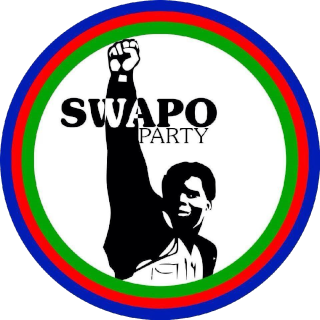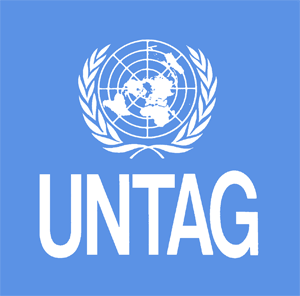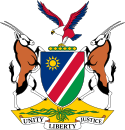
Namibia, officially the Republic of Namibia, is a country in Southern Africa. Its western border is the Atlantic Ocean. It shares land borders with Angola and Zambia to the north, Botswana to the east and South Africa to the east and south. Although it does not border Zimbabwe, less than 200 metres of the Botswanan right bank of the Zambezi River separates the two countries. Its capital and largest city is Windhoek.

South West Africa, de jure renamed to Namibia from 12 June 1968 by the United Nations, was an occupied part of the Union of South Africa and later the Republic of South Africa from 1915 to 1990, after which it became modern-day Namibia. It bordered Angola, Botswana, South Africa, and Zambia. During its administration, South Africa applied its own apartheid system in the territory of South West Africa.
The history of Namibia has passed through several distinct stages from being colonised in the late nineteenth century to Namibia's independence on 21 March 1990.

The South West Africa People's Organisation, officially known as the SWAPO Party of Namibia, is a political party and former independence movement in Namibia. Founded in 1960, it has been the governing party in Namibia since the country achieved independence in 1990. The party continues to be dominated in number and influence by the Ovambo ethnic group.

Samuel Shafiishuna Daniel Nujoma, is a Namibian revolutionary, anti-apartheid activist and politician who served three terms as the first President of Namibia, from 1990 to 2005. Nujoma was a founding member and the first president of the South West Africa People's Organization (SWAPO) in 1960. Before 1960, SWAPO was known as the Ovambo People's Organisation (OPO). He played an important role as leader of the national liberation movement in campaigning for Namibia's political independence from South African rule. He established the People's Liberation Army of Namibia (PLAN) in 1962 and launched a guerrilla war against the apartheid government of South Africa in August 1966 at Omugulugwombashe, beginning after the United Nations withdrew the mandate for South Africa to govern the territory. Nujoma led SWAPO during the lengthy Namibian War of Independence, which lasted from 1966 to 1989.

The Popular Democratic Movement (PDM) is an amalgamation of political parties in Namibia, registered as one singular party for representation purposes. In coalition with the United Democratic Front, it formed the official opposition in Parliament until the parliamentary elections in 2009. The party currently holds 16 seats in the Namibian National Assembly and one seat in the Namibian National Council and is the official opposition. McHenry Venaani is president of the PDM.
Dirk Frederik Mudge was a Namibian politician. He served in several high-ranking positions in the South African administration of South West Africa, was the chairman of the 1975–1977 Turnhalle Constitutional Conference, and co-founded the Republican Party (RP) of Namibia as well as the Democratic Turnhalle Alliance (DTA), now known as the Popular Democratic Movement (PDM).

The United Nations Transition Assistance Group (UNTAG) was a United Nations (UN) peacekeeping force deployed from April 1989 to March 1990 in Namibia, known at the time as South West Africa, to monitor the peace process and elections there. Namibia had been occupied by South Africa since 1915, first under a League of Nations mandate and later illegally. Since 1966, South African forces had been combating an insurgency by the People's Liberation Army of Namibia (PLAN), the military wing of the Namibian-nationalist South West African People's Organization (SWAPO). The UN Security Council passed Resolution 435 in 1978, which set out a plan for elections administered by South Africa but under UN supervision and control after a ceasefire. However, only in 1988 were the two parties able to agree to a ceasefire. As UNTAG began to deploy peacekeepers, military observers, police, and political workers, hostilities were briefly renewed on the day the transition process was supposed to begin. After a new round of negotiations, a second date was set and the elections process began in earnest. Elections for the constitutional assembly took place in November 1989. They were peaceful and declared free and fair; SWAPO won a majority of the seats. The new constitution was adopted four months later and it was followed by Namibia's official independence and the successful conclusion of UNTAG.
Jacobus Willem Francois Pretorius, commonly known as Kosie Pretorius, was a Namibian politician. He was the Chairman of the Monitor Action Group party, which mainly represents conservative white Namibians, and was a member of the National Assembly of Namibia from 1990 to 2005.

The Transitional Government of National Unity (TGNU), was an interim government for South West Africa (Namibia) between June 1985 to February 1989.
Johannes Marthinus de Wet was a Namibian politician and farmer.

The Turnhalle Constitutional Conference was a conference held in Windhoek between 1975 and 1977, tasked with the development of a constitution for a self-governed South West Africa (Namibia) under South African control. Sponsored by the South African government, the Turnhalle Conference laid the framework for the government of South West Africa from 1977 to independence in 1989.
The Federal Convention of Namibia (FCN) was a political party based in Rehoboth, Namibia. It was created in the wake of Namibian independence in 1988 by a merger of several smaller parties and gained a seat in the Namibian Constituent Assembly. After also-ran results in 1994 and 1999 it ceased to be publicly active.
The National Patriotic Front is a political party in Namibia.

Parliamentary elections were held in South West Africa between 4 and 8 December 1978. These were the first elections conducted under universal adult suffrage, all previous elections had been Whites-only. The 1978 elections were won by the Democratic Turnhalle Alliance, which claimed 41 of the 50 seats. The elections were conducted without United Nations (UN) supervision, and in defiance of the 1972 United Nations General Assembly's recognition of the South West African People's Organisation (SWAPO) as the "sole representative of Namibia's people". The UN henceforth declared the elections null and void. The resulting government, dependent on South African approval for all its legislation, was in power until its dissolution in 1983.

The National Party of South West Africa was a political party in South West Africa.

The Australian Services Contingent was the Australian Army contribution to the United Nations Transition Assistance Group (UNTAG) peacekeeping mission to Namibia in 1989 and 1990. Australia sent two contingents of over 300 engineers each to assist the Special Representative of the Secretary General, Martti Ahtisaari, in overseeing free and fair elections in Namibia for a Constituent Assembly in what was the largest deployment of Australian troops since the Vietnam War.









